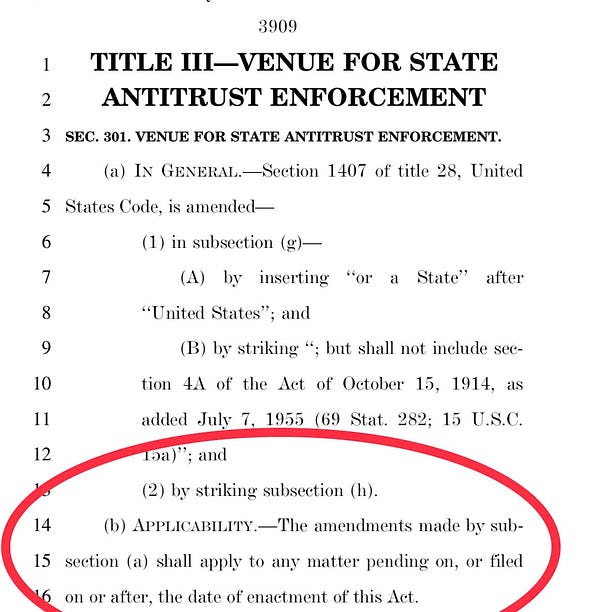Too Much Winning: Antitrust Reform to Become Law
Congress will now write into law the first major enhancement of antitrust law since 1976. And anti-monopolists accomplished this feat against the wishes of both Senate leaders.
Today I’m writing about how Congress is about to put the most significant antitrust reform since 1976 into law. But don’t worry, there’s also some bad news, as Senator Chuck Schumer made sure that tech antitrust provisions didn’t get into the final package.
I will cover the FTC’s fine of Epic Games in a few days, since that’s an important action that will change how the internet works. But for now I want to explain what Congress just did with antitrust law and why you should be pretty excited.
The Biggest Change in Antitrust Statute Since 1976
Five years ago, if someone would have told me that two powerful Senators - Republican Mitch McConnell and Democrat Chuck Schumer - cut a backroom deal to strengthen antitrust law, I would have rolled my eyes and laughed. There are so many reasons why it’s a ridiculous notion, the key one being that both of them are literally avatars of corporate power. And yet, it just happened. Today, we got a look at the final deal that is going to keep the government open, the last vehicle with any legislating at all. And it includes a bunch of important antitrust reforms.
So here’s what is in there, why it matters, and what it portends going forward.
First, the bad news. A lot of ink has been spilled about the tech antitrust bills, in particular one to help newspapers, a bill to break open app stores, and a bill to address non-discrimination on platforms. These were all dropped. It’s true that large tech firms spent hundreds of millions of dollars to lobby against them, but the reality is that they were dropped because Schumer is a fairly strong opponent of antitrust law. Schumer, as I said last week, leans towards enabling dominant tech firms. There’s a long list of his work on behalf of finance and monopoly in general, everything from hospital purchasing monopolies to protecting the carried interest loophole for hedge fund managers. But it’s also personal; one of his daughters works at Meta, and another works at Amazon.
But it wasn’t just Schumer. He was negotiating with Mitch McConnell, the Republican architect behind the landmark Citizens United Supreme Court decision. McConnell’s entire political career is organized not just around boosting corporate power, but the virtues of collecting corporate money to use in elections. His strategy has been to break the legislative process, and then let monopoly-friendly judges interpret the law. Facilitating corporate concentration is not just a way of acquiring power for McConnell, it is the very point of politics.
Neither Schumer nor McConnell are invested in the substance of antitrust law, but it would be harder to find a worse duo to be cutting a deal, if your goal is to address monopoly power. They weren’t the only ones involved. Nancy Pelosi was also in the negotiations, and she advocated for antitrust. She’s the only legislative leader who actually put a bill on the floor for a vote. There were some key people in the White House who pushed, but it wasn’t a high enough priority for Biden himself. That’s generally the case for most policymakers, they don’t like monopolies, but it’s not a high priority to address them, because they don’t connect monopoly power to the central social problems they care about. That’s changing quickly, but we’re still in transition.
And yet, Schumer-McConnell-Pelosi did actually include some very important provisions in the final package, because antitrust was too popular to ignore. Senators Amy Klobuchar, Elizabeth Warren, and Richard Blumenthal were pestering Schumer, as was David Cicilline, and people from the administration. And they did so with a friendly context. For years, politicians, writers, business people, workers and advocates have made the case that we face a monopoly crisis, and enforcers, judges, and Congress must act. These arguments, in the face of huge sums of money, actually worked. It’s to the point that CNN’s Jake Tapper now confronts Democratic politicians and asks whether they are the party of fighting monopolies.

That’s a huge accomplishment, to make a policy issue so resonant that even its opponents have to concede some ground. My guess is that McConnell and Schumer didn’t want to include antitrust reform in the package, but had to do so.
So what did advocates get?
Well the deal includes the antitrust legislation that passed the House in September, slightly modified. And as it becomes law, the bill opens up a number of opportunities for more aggressive enforcement.
First, the new law will unleash state officials to pursue antitrust claims. One of the more important but unnoticed trends in the last ten years has been the emergence of state attorneys general as aggressive antitrust enforcers. During the Trump era, it was state AGs who challenged key mergers, like Sprint-T-Mobile. Today, the Washington state attorney general Bob Ferguson has blocked the payout of supermarket giant Albertsons’s special dividend. (It’ll stay blocked until February, when the state Supreme Court will make a decision.)
State officials like Ferguson, as well as others such as Ken Paxton in Texas, Leticia James of New York, and Phil Weiser of Colorado, are effecting a revolution in antitrust enforcement. State officials enforce even when the Federal government changes hands, or is flaccid. And state AGs can hire private plaintiff firms. The bill will help them by removing a big procedural hurdle against state claims. Right now, state AGs can file cases, but if there’s a similar one anywhere else in the nation, their case will get combined and moved, usually to a jurisdiction friendly to the monopolist. This happened to the Texas AG, whose case against Google got kicked to New York, which is friendlier to the search giant.
With this legal shift, state attorneys general can bring a case in their home court, and it’ll stay there. That means Pfizer, or Google, or whoever, may face lots of litigation in different regions of the country, not just where they are comfortable. Moreover, the bill got stronger from the one that passed the House. This bill applies to all pending legislation, which means it applies to Google’s Texas case that got moved to New York. The original bill wasn’t retroactive. So Google can’t be happy about this one, and are probably lobbying furiously to get it overturned.


That’s not the only shift in law. There is a provision that will force firms who are merging to tell the FTC and Antitrust Division about any Chinese subsidies they receive. This is an expansion of the authority of these agencies to collect information, especially from Fortune 500 firms who have a lot of ties to the Chinese government. It’s a sleeper provision, but one that I suspect will keep a lot of antitrust attorneys up late and prevent some mergers from moving.
Finally, there’s a funding change. The merger bill raised filing fees on big mergers, and that money was supposed to go to the Antitrust Division and Federal Trade Commission. But Schumer and McConnell agreed to delay it for two years, which means that the money will be withheld from the agencies until after Biden’s first term. So that’s a bit of a middle finger to the agencies from the two leaders.
That said, in the base bill, the FTC’s budget will go from $379 million to $430 million, and the Antitrust Division’s will go from $193 million to $225 million. That’s an increase of about 14%, which isn’t enough to bring the agencies back to where they were in the 1970s, but it’ll mean more resources to bring cases. And given the Federal Trade Commission just fined Epic Games over half a billion dollars, is in the midst of a trial against Meta’s acquisition of Within, and is challenging Microsoft’s purchase of Activision, it’s clear those resources will turn into action.
Whither the Future
Going forward, these changes are going to allow for more enforcement actions, and more aggressive enforcement policy. They signal to judges that Congress is interested in antitrust. With the more than one hundred judges appointed by Biden, who are likely more friendly to antitrust, plus these legal changes, we’ll see a less friendly environment for mergers and unfair methods of competition.
I also suspect Congress isn’t done. The passage of this reform will whet the appetite for members of Congress to get more involved in shaping the law. Next session, the House Republican leadership, though generally skeptical about antitrust, is likely to do something on app stores. There’s also a chance that they will move on legislation by Utah Republican Senator Mike Lee, which would break up Google, Meta, and Amazon’s advertising businesses. And with a narrow House majority, there are additional weird opportunities to change statute.
Anyway, there are always ways to look back and see how we could have done better. Pessimism is the more natural state in politics, and there’s always a pervasive narrative that big corporations are unbeatable, all-powerful titans. But the truth is, that narrative is wrong. Not only did we win something big, but we’re set up to win much more going forward. The people in charge are just people, and they do listen to voters. Democracy can deliver, and in fact, it just did.
Thanks for reading!
And please send me tips on weird monopolies, stories I’ve missed, or comments by clicking on the title of this newsletter. And if you liked this issue of BIG, you can sign up here for more issues, a newsletter on how to restore fair commerce, innovation and democracy. And consider becoming a paying subscriber to support this work, or if you are a paying subscriber, giving a gift subscription to a friend, colleague, or family member.
cheers,
Matt Stoller



I watched the zoom of the hearing in WA State Superior Court with Judge Ken Schubert. I was astonished by the circular reasoning he used to justify his denial of a temporary injunction to prevent the payment of an enormous windfall to Albertson’s “stakeholders.” He maintained with a fairly straight face that since the windfall had not yet been paid and the predicted dire consequences had thus not occurred, there was nothing for him to rule on. He said several times that Albertson’s financial acrobatics were not subject to litigation because the court cannot tell private corporations how to spend their money. I am relieved to learn that the Supreme Court granted an extension - and AG Ferguson has until Dec.19th to appeal Schubert’s damaging decision. I live in a community that was strip-mined by Albertson’s acquisition of Haggen’s. If this merger is allowed to proceed our community will be very negatively affected. We are pulling for Ferguson and so glad he is our AG - a hero in my mind.
"Five years ago, if someone would have told me that two powerful Senators - Republican Mitch McConnell and Democrat Chuck Schumer - cut a backroom deal to strengthen antitrust law, I would have rolled my eyes and laughed."
The two-party system is why the USA continues to shit the bed, politically speaking. It is toxic and results in constant devolution. Back room deals are easy to make when there are only two sides. Evil and mediocrity always end with evil winning.